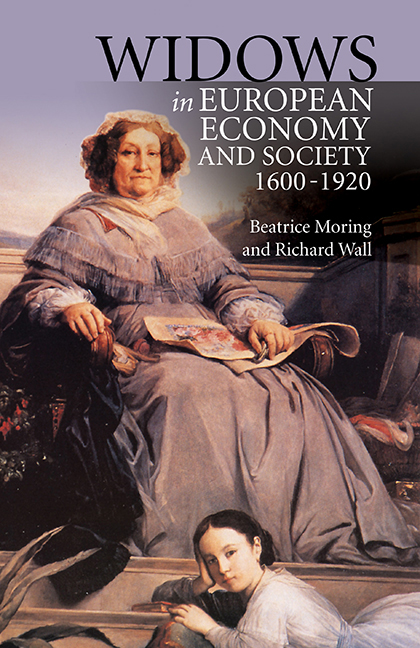Book contents
- Frontmatter
- Contents
- List of Plates
- List of Tables
- Acknowledgements
- Introduction
- 1 Widows and Poverty
- 2 Widows, Legislation and Property
- 3 Assessing the Assets of the Widow
- 4 Life Interest, Usufruct or Pension, The Mainstay of the Widow?
- 5 Urban Widows, Economy and Family
- 6 The Demography of Widowhood
- 7 Household Structure, Age, Social Status and Geography
- Conclusion
- Appendices
5 - Urban Widows, Economy and Family
Published online by Cambridge University Press: 30 August 2017
- Frontmatter
- Contents
- List of Plates
- List of Tables
- Acknowledgements
- Introduction
- 1 Widows and Poverty
- 2 Widows, Legislation and Property
- 3 Assessing the Assets of the Widow
- 4 Life Interest, Usufruct or Pension, The Mainstay of the Widow?
- 5 Urban Widows, Economy and Family
- 6 The Demography of Widowhood
- 7 Household Structure, Age, Social Status and Geography
- Conclusion
- Appendices
Summary
THE opportunities to be found in a city have always had a considerable level of attraction, relative to the countryside, and by the year 1700, Paris, Venice, Milan, Moscow, Vienna, London, Rome, Lisbon and Prague, to name but a few, had populations exceeding 100,000. However, urban living could be of more modest proportions, as in the Nordic countries, and the increase in people in Europe living in cities of more than 5000 persons grew only from ten to twelve percent between 1600 and 1800.
The physical environment of pre-industrial European small towns was sometimes not unlike the countryside. Old maps and place names reveal the locations of areas where the town burghers grazed their cattle or grew cabbages. The buildings were set around a yard, with cowsheds and stables. The wives of craftsmen and tradesmen were milking, baking and brewing, salting meat and making textiles. Artisans’ households were not very different from farms engaged in household production. While the apprentices had clearly defined tasks, servants and family members could be participating, not only in housework, but also in the workshop. Bakers and brewers seem to have favoured such arrangements, but they were not unknown in other fields.
The population of early modern towns was divided into hierarchical groups. A considerable proportion of manufacture was controlled by the guilds; however, the rate at which these gained control over operations varied. In certain parts of northern Europe, their control over the local economy was not achieved until the seventeenth century. Some manufacture remained outside guild control, as did, of course, a certain proportion of manual work. Although the most influential citizens were to be found among opulent merchants, or within the guilds, it should be remembered that these represented only one part of the urban population. In German towns, and along the Baltic, a distinction was also made between those engaged in local trade and those involved in overseas trade. The most important distinction was, however, that between legal urban dwellers with town privileges or citizenship, and outsiders. Even a menial manual worker, legally domiciled in a town, bestowed upon his widow the right to reside, remain and apply for the privilege of engaging in a trade.
- Type
- Chapter
- Information
- Widows in European Economy and Society, 1600-1920 , pp. 147 - 182Publisher: Boydell & BrewerPrint publication year: 2017



